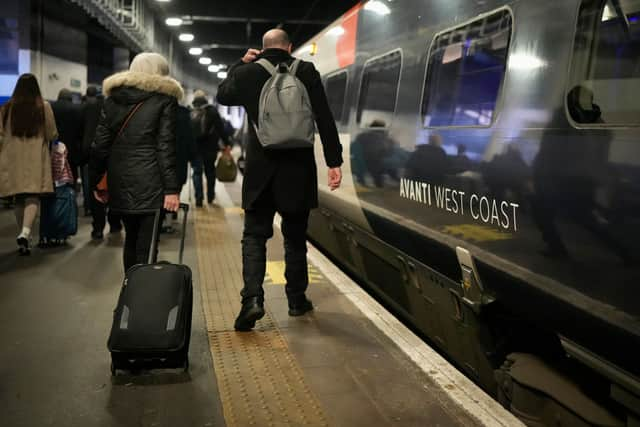Train firms made £310 million in profit under new government contracts, claims union
and live on Freeview channel 276
The train companies embroiled in the continuing rail strikes have made hundreds of millions of pounds in profit in the last two and a half years thanks to new contracts agreed by the government, according to a leading trade union.
The RMT says that official data from the Department for Transport shows the new contracts agreed during the Covid-19 pandemic allowed private train operators to make £310 million in taxpayer-funded profit between March 2020 and September 2022 while rail workers have faced a pay freeze. It says by September this year that figure will have reached £400m, all of which, it says, could be turned into shareholder dividends.
Advertisement
Hide AdAdvertisement
Hide AdThe RMT argues that if these profits had been reinvested in the rail industry, they would have been enough to fund a 10.6% pay rise for rail workers - more than recent offers made to union members.
However, rail company representatives have said the figure is “not based in reality” and claimed the industry was losing money “at a frightening rate”.
The RMT, which is behind the most disruptive strike action, has rejected a pay offer from train companies of 4% last year and 4% this year, saying a “host of unacceptable changes” were included such as the widespread expansion of driver-only operation on train services.
Members have just finished four days of strike action which affected train operators as well as Network Rail and brought 80% of the country’s rail services to a standstill. The two blocks of 48-hour walkouts were the latest in a series of strikes which have crippled the rail network since June last year.
Advertisement
Hide AdAdvertisement
Hide AdRMT general secretary Mick Lynch said: “While the Secretary of State and the Rail Delivery Group spin about the need for reform to fund pay rises, the truth is that the money was always there but it’s being salted away by a gang of profiteers and their mates in the government.
“It’s outrageous that the interests of workers, passengers and the taxpaying public are all sacrificed to the greed of a handful of private transport companies who are being guaranteed profits when they can’t run a railway even when we’re not on strike.
“While executives and the rich make millions, our members are being asked to accept substandard pay offers and a ripping up of their hard fought for terms and conditions, during an escalating cost-of-living crisis.”


A spokesman for the Rail Delivery Group, which represents the train operators, said: “This figure is not based in reality. The strikes over the festive period and this week will have taken around well over £300m out of the railway in lost revenue.
Advertisement
Hide AdAdvertisement
Hide Ad“Far from making profits the railway is losing money at a frightening rate, risking the long-term future of the industry.
“The franchise model no longer exists and train operators are paid on a performance-related fixed fee basis of 0.5% to provide a service, like many other government suppliers.
“Even if that figure were removed in its entirety it would not come close to funding the pay rises unions are asking for.”
Lynch, who is meeting Transport Secretary Huw Merriman this week, added: “It’s time the interests of workers and passengers were put first. We need a negotiated settlement with both the rail operators and Network Rail and the Government needs to stop blocking these deals.”
Advertisement
Hide AdAdvertisement
Hide AdThe Government denies it is blocking a deal, insisting it is facilitating talks between employers and the unions.
A Department for Transport spokesman said: “Passengers have rightly had enough of rail strikes and want the disruption to end. Unions should step back from this strike action so we can start 2023 by ending this damaging dispute.”
Comment Guidelines
National World encourages reader discussion on our stories. User feedback, insights and back-and-forth exchanges add a rich layer of context to reporting. Please review our Community Guidelines before commenting.
